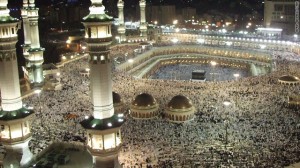Why do Hajj? 5 Questions Answered
About 3 million Muslims from more than 100 countries will pack the city of Mecca, Saudi Arabia, next month for Hajj, the biggest pilgrimage on the planet.
What’s it all about? We turned to Brown University Muslim chaplain and CNN iReporter Robert David Coolidge and Nihad Awad, executive director of the Council on American-Islamic Relations, for a primer:
1. Why do Hajj?
According to Islam, every Muslim is expected to make the pilgrimage at least once if they are healthy and can afford to. Some people spend their whole lives saving for the trip, while others return many times for spiritual enlightenment and forgiveness, says Coolidge, who will make his second pilgrimage this year with his wife.
“There’s the belief that one’s prayers in the mosque in Mecca are multiplied many, many times,” Coolidge said.
Only Muslims are allowed in Mecca, and the Saudi government sets quotas for each country to control the crowds. Because Coolidge’s name isn’t “recognizably Muslim,” he had to get written proof of his faith from a local imam.
2. What do you do on Hajj?
Think of it as a “spiritual boot camp,” Coolidge said. Participants perform a series ofreligious rituals, visit holy sites, engage in intense prayer and attend lectures.
It’s also a chance to network with Muslims from all over the world, Awad said.
“If you’re coming from the U.S., your tent might be someone from Ghana. The next tent next to you may be from Southeast Asia,” Awad said. “That is a huge opportunity for people to mingle and know about each other.”
3. Where do people stay?
The Saudi government puts up thousands of large white tents that each house about 100 people. Other tents are designated for toilets and showers. Most people travel with a group that takes care of all the details, including meals, Awad says. Participants typically stay in hotels before and after the Hajj to visit sites in Mecca and the city of Medina.
4. What happens after Muslims perform Hajj?
Those who make the pilgrimage often return “a different person,” Awad said. “You come back born again, washed of your sins. You come back as a new person, a more humble person, a person who wants to help other people and be compassionate and do the right thing.”
Besides coming back more religiously observant, Muslims who undertake the Hajj return to their home countries with more positive views toward other cultures andgreater tolerance of non-Muslims, a 2008 study of Pakistani pilgrims suggested.
5. This will be the first Hajj since the Arab Spring revolutions. Could the event build solidarity among Muslims fighting governments in their home countries?
Possibly, but it’s not likely, Coolidge and Awad say. The revolutions will no doubt be a topic of conversation, and people may return from their spiritual journeys ready to “stand up for justice,” Awad said. But the Hajj tends to be an apolitical event.
“It has always been conveyed that this is a time and a place when the various Muslim communities should set aside their political differences or political concerns and focus on the spiritual unity of the Muslim community and the fact that everybody is there in the same place to do the Hajj together,” Coolidge said. “It’s possible that something could be different this time around, but I don’t think so.”
Are you planning to make the holy pilgrimage? CNN iReport is looking for travelers interested in documenting their journey for CNN. In a video of two minutes or less, tell us who you are, where you live and why you’re embarking on this journey of a lifetime.


















